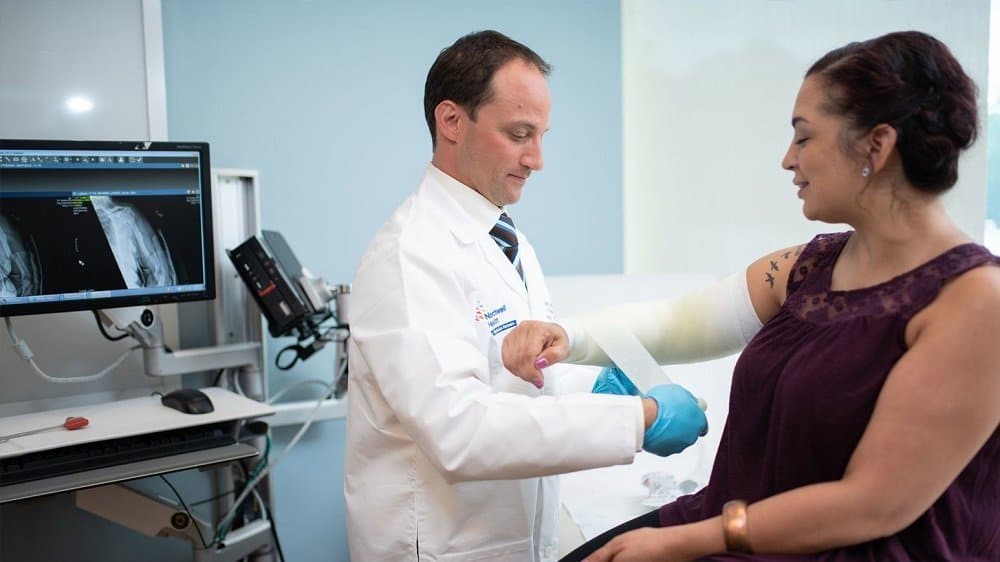Why Choosing the Right Doctor is Critical for Your Personal Injury Case
One of the most important aspects of a personal injury case is choosing the doctors who will be treating you. While it is imperative that you seek medical treatment immediately following an injury, the doctors you choose and the care that follows will ultimately determine not only your recovery, but also if you have a solid personal injury case or not.
Insurance companies will use any excuse possible to avoid paying for injuries legitimately caused by an accident. One of the biggest excuses not to pay is the claim that the person was not really hurt in the accident. If you do not get evaluated by a doctor on the day of the accident, the insurance company will point to the lack of treatment as proof you must not have been hurt. The insurance companies are taking advantage of the fact that after an accident, an adrenaline rush can mask the pain from an injury.
In reality, it is common for people to say they did not realize they were hurt that badly until the next day. To eliminate this common insurance company tactic, you should err on the side of getting checked out by a health care provider the same day as the accident, if you are experiencing any symptoms.
Usually, after an injury or an accident, the best doctors to go to are emergency room doctors. In fact, by going to the emergency room for treatment and being sure to tell the doctor about all of your symptoms and pain, you will get solid documentation and the attention you deserve.

Even minor pain after an accident can be a symptom of something that may become a chronic issue or could indicate a larger problem and the need for future surgery, so it is important to be completely honest and forthcoming when describing all issues that are related to the way you are feeling. Don’t hold back any details, no matter how insignificant they may seem at the time. Assessment at an emergency room is generally quite thorough, and again, very importantly, it is usually very well documented.
After treatment at an emergency room or even a hospital stay, you will be directed to seek follow up with your own physician or other specialists. Seeing the right doctors who gather and document injury information that is supported by credible medical records and tests is the most important step to your ultimate goal of getting the necessary treatments, surgeries, or physical therapy to help you heal.
Primary care doctors are great at treating many things. Unfortunately, they usually have very little experience in treating people injured in an accident. Their focus is internal medicine and not trauma related injuries such as neck pain, back pain, concussions, and broken bones. Primary care doctors are also not used to documenting traumatic injuries. This is important because insurance companies rely on documentation to determine the value of your claim. If your injuries are not properly documented, the insurance company will claim you must not really be hurt as bad as you are.
Even though your primary care doctor should not be the main doctor you treat with, you should still report your injuries to them as soon as possible. They can refer you to the proper specialists and document your efforts to get treatment. In addition, whenever you see your primary care physician for visits unrelated to the accident, make sure you tell them about your accident related injuries. This extra documentation will help prove you are still in pain.
The type of specialist you may need will depend on your injuries. Some common specialists that treat trauma injuries include chiropractors, neurologists, orthopedic surgeons, and physiatrists. Your primary care doctor can often provide you with a recommendation for one of these physicians.

An experienced and knowledgeable personal injury attorney can also help you find the best doctor to treat you. Either way, the most important thing is to find reputable physicians who meticulously gather and authenticate medical evidence. The best physicians will accurately assess your pain and any degree as to the loss of mobility, identify possible restrictions on your ability to work, and evaluate the extent that your injuries have impacted your ability to enjoy the same quality of life you had prior to the injury. This assessment may also include the diagnosis of depression and anxiety as a result of the injury.
Currently, Florida requires all car owners to have PIP insurance to pay up to $10,000.00 toward medical care after a car accident. If you do not have PIP, you do not have health insurance, or your injuries occurred in something other than a car accident, there are other alternatives. If you are seriously injured go to the hospital because hospitals cannot refuse to treat an injured person even if the person cannot afford to pay.

Another alternative is something called an Insurance Security Agreement. This is a contract you enter with your health care provider. Basically, your health care provider agrees to provide you with treatment now and wait on payment until your personal injury case is resolved. In exchange you agree to pay your health care provider out of any recovery obtained in your personal injury case. Of course, your health care provider is taking a risk that you will ultimately be able to pay your bill.
The two most important factors your health care provider will take into account in deciding whether to enter into an Insurance Security Agreement are the likelihood you will succeed in your personal injury case and the quality of your personal injury attorney.
In a personal injury case, while the doctor’s job is to focus on your medical condition and help you heal, you are responsible for gathering the most accurate information, making the right medical care choices, and finding the best legal support to present the strongest case possible.
If your case should go to court, it is of the utmost importance to have a treating doctor who is familiar with the details of your case throughout treatment and who provides medical facts with documented records along the way. You need to be honest and upfront with your physician at all times and diligent about your recovery process. If there is a long period of medical treatment and the injury takes a long time to heal, that usually translates to a high level of pain and suffering. Without a treating doctor’s testimony regarding the entire process and your attentive efforts in the recovery process, it is difficult to make a case for injury claims.
Remember, most personal injury cases will likely be contested. An insurance company may deny coverage for an injury because of incomplete medical records. Even with a supportive doctor and documented treatment plans you have a big responsibility to follow their prescribed care closely. Never miss doctor appointments or fail to complete therapy sessions. Be sure to take prescribed medications and do not stop medical treatments without your physician’s advice. Make a point to provide specific information regarding pain to your doctor, and ask for it to be included as part of your official medical records. Keep copies of treatment referrals, work restrictions, and anything you give to your doctor’s office, checking with your legal counsel first. It is also a good idea to keep your own timeline of events and notes.
Some medical doctors do not like to treat patients that have a personal injury case. These types of doctors may have been involved in personal injury lawsuits in the past and for various reasons have distaste for any involvement in the future. Some of them have been swayed by propaganda into thinking it is wrong to hold someone accountable for causing injury. Some of them may be afraid of the possibility of having to testify in court about your injuries. These doctors will not be as thorough in documenting your injuries and their biases could hurt your case. As a result, if your doctor expresses any reservations about you making a personal injury claim, you should find another doctor.

Another type of physician to be leery of is a doctor who works for the defending insurance company and performs defense medical exams of accident and personal injury victims. These doctors often claim they are performing an independent medical exam or IME. In truth, there is nothing independent about them. These exams are for the benefit of the insurance companies and the examining doctor is not to be considered as a treating physician. You may be required to be seen by such a doctor, but remember, these doctors are defense experts and will find a way to minimize your claim or show that the insurance company is not responsible for the injuries.
We’ve included just a few of the recommendations and types of situations with regard to personal injury claims, but keep in mind, every case is as unique as the individual. Don’t let the insurance company avoid compensating you because you chose the wrong physician or, proper documentation was not made from the start. If you have any doubts about your physician, the best course of action is to discuss your doubts with your personal injury lawyer.

As an ethical and trusted personal injury lawyer, Scott Distasio founded Distasio Law Firm in February of 2006, which focuses on all types of personal injury cases. He wanted to open a law firm that represented his belief that all firms should provide ethical and outstanding service to their clients.



